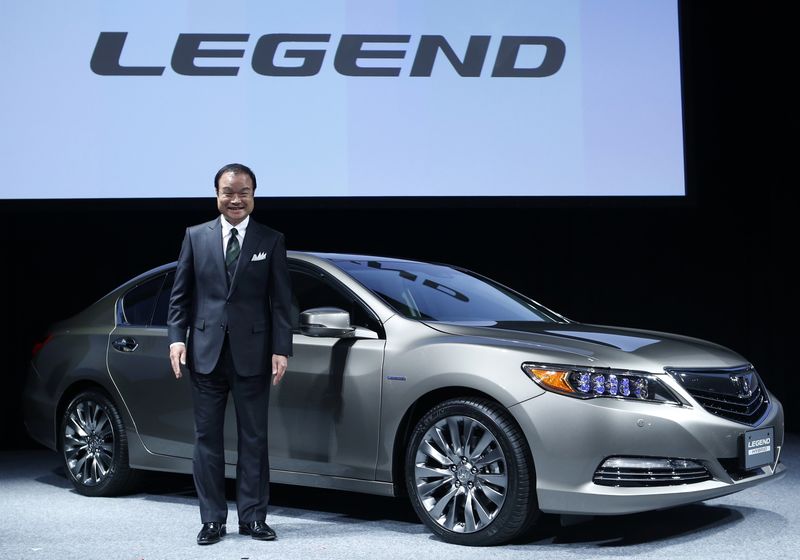By Norihiko Shirouzu
(Reuters) - Honda Motor CEO Takanobu Ito, under fire for how he is dismantling the traditional way the Japanese car maker sources parts and technologies, has resisted moves for his ouster and will fight on for another two-year term, according to four people with direct knowledge of the matter.
Ito took over in 2009, and for the past three years has shaken up Honda's decades-old, tightly-knit supply chain, looking to trim costs while finding more cutting-edge technologies. That's rankled long-term local suppliers, and some former Honda chiefs, and the pressure on Ito has been ratcheted higher by mass recalls over quality issues. Some retired executives maneuvered to have Ito removed.
"Honda's group suppliers were thrown into disarray by Ito's actions. The way things are going, they're soon all going to become subcontractors with no technologies of their own," said one former Honda chief.
But Ito, a former super-car engineer, is determined to see his reforms through, and told his critics as much at a recent meeting with some former Honda chiefs, said two of the knowledgeable individuals. None of the sources wanted to be named because of the sensitivity of the issue.
"Since the start of this year, we've been operating on the assumption that Ito will continue as chief executive," said a Honda divisional head, adding Ito has a "70 percent" chance of keeping his job.
"Ito is determined to keep going as CEO," said another individual, who was a senior Honda executive in the 1980s. "We're generally okay with that."
Honda spokesman Kaoru Tanaka declined to comment on Ito's position, but noted the company "procures components in the most optimal way possible, taking into consideration cost, quality and delivery. That policy remains unwavering and unchanged."
R&D RESET
One of Ito's moves to reset research and development priorities was to focus on vehicle electrification by courting global suppliers such as Robert Bosch [ROBG.UL], Continental and TRW Automotive [TRWTA.UL]. Contracts have even gone to Denso, a supplier part-owned by rival Toyota Motor Corp, often bypassing Honda's local suppliers such as Keihin Corp and Showa Corp.
Deflecting any talk of a crisis, Keihin spokesman Hidekazu Nagasawa said Honda's procurement reforms were "an opportunity to ... develop better technologies and more innovative, cost-effective ways to manufacture them, and sell them ... not just to Honda but other automakers."
While Ito's critics acknowledge a need to change how global automakers like Honda develop their technologies, they believe Ito has moved too hastily, and they have been quick to point to damaging product recalls as symptomatic of his rush to reform.
Besides having to recall more than 13 million cars for potentially lethal air-bag inflators made by Takata Corp, Honda has been hit by five recalls of its Fit subcompact car and Vezel crossover utility vehicle since their 2013 launch. Ito's critics note the defects mainly involved German supplier Schaeffler's hybrid transmission technology, and how Honda engineers integrated it with their other vehicle technologies.
Former CEO Nobuhiko Kawamoto was so concerned that he visited Ito in October and warned him about the quality and reliability slippage that he said risked damaging the Honda brand, the knowledgeable people told Reuters.
'YAESU CLUB'
In Japanese corporate culture, former chiefs retain more clout than in the West.
The Honda grandees, dubbed the "old boys," maintain a Tokyo office known informally as the Yaesu Club. Under an unwritten code, they don't intervene in day-to-day management, but some have ramped up the pressure on Ito by airing their complaints internally, two of the knowledgeable individuals said.
"We're all worried and irritated by Ito's audacious, not-so-well-thought-out reform moves," the ex-Honda chief said.
A company insider close to the CEO, said Ito understands where his critics are coming from, and would likely slow the pace of reform. On the credit side, Honda shares have risen 37 percent since Ito took over as CEO, and operating income has more than trebled since his reform drive began.
To provide some help to existing suppliers, Ito may follow Toyota's lead and seek to consolidate some of the supply chain, possibly combining transmission units of Musashi Seimitsu, Yutaka Giken and Atsumitec into a single entity. Spokespeople for those companies declined to comment.
While some suppliers have kept pace with industry changes, others have struggled. "In a next stage, the possibility of a consolidation of Honda group transmission producers is definitely there and real," said a representative from one supply company, asking not to be identified.
Ito, meanwhile, remains committed to long-term reforms to Honda's R&D and technology procurement.
"He believes Honda needs new blood from outside to break new technological ground ... and make a new departure," said another of the Honda insiders.

(This story corrects Denso ownership in paragraph 8)